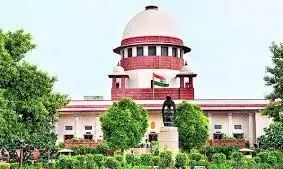
SC observes Centre's vaccine policy detriment to public, seeks change
text_fieldsNew Delhi: The Supreme Court has urged the Centre to take measures to rationalise the delivery of vaccine and ensure the availability of vaccine stock for the next 6 months.
Obverting the Centre's current vaccine policy "detriment to public health", citing Article 21 of the Constitution, the three-judge bench comprising of Justices DY Chandrachud, L Nageswara Rao and S Ravindra Bhat has urged the Centre to revisit its vaccine procurement policy.
It also wanted both Centre and State governments to consider imposing stringent measures like lockdowns to bring the COVID infection under control.
Stating the economic and other impacts of lockdowns on citizens, particularly on the marginalised communities, the Court urged governments at the Centre and States to make arrangements beforehand to cater for the necessary needs of the people.
The top court has also asked the Centre to formulate a national policy on admissions to hospitals within two weeks, which ought to be trailed by all states.
Earlier, on April 20, the centre had revised its vaccine policy and said it would purchase only 50 per cent of the output, and allow vaccine manufacturers to sell the balance 50 per cent directly to states and private entities at higher prices.
The bench, however, observed that compelling states to negotiate with manufacturers on the ground of promoting competition will likely be detrimental to those in the 18-44 age group and other underprivileged and marginalised groups who may not have the ability to pay.
"This will create disparity across the nation. The vaccinations being provided to citizens constitute a valuable public good. Discrimination cannot be made between different classes of citizens…," the bench said.
The court also stated that it's illogical to impose an obligation on the states to source vaccinations for the 18-44 age group and leave them "to negotiate supply schedules, delivery points and other logistical arrangements with the manufacturers" as " it will produce chaos and uncertainty".
The Supreme Court also wanted to know whether the Centre intended to consider granting compulsory licence to enable more manufacturers to make the vaccines and essential drugs like remdesivir to ensure adequate supplies.
The apex court has also ordered the Centre to "immediately" create buffer stocks of medical oxygen and rectify the current shortage in the supply of oxygen to the GNCTD on or before midnight of 3 May 2021.






















